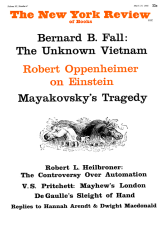In response to:
"The Formidable Dr. Robinson": A Reply from the January 20, 1966 issue
To the Editors:
…I feel it my duty now to speak and to break my silence, in order to name the names of dead friends: rabbis, who—with one exception—were killed by the Nazis, although they had more than one chance to escape. They had no need to “volunteer for deportation”; they remained, yes, remained with their congregations in life as in death: Erno Hoffmann (Breslau); Jacob Horowitz, (Frankfurt a.M.), who ended in suicide refusing to desecrate the Tora; S. Mark (Czernowitz); and, finally Leo Baeck (Berlin), who went to Theresienstadt, although he had many offers to come to America. If they had “volunteered” for deportation, Miss Arendt would have accused them of cooperating with the Nazi-authorities.
What moral right has Miss Arendt to hint slyly at the probity and courage of rabbis, who gave their lives; what right has she to imply that they had shirked their duty and their honor? I ask her: What right has she even to mention such matters, let alone to discuss them, when she was not there? Was she ever forced to submit to the gradual moral and physical ruination of a helpless and forsaken minority under inconceivable circumstances? Let her answer my question! But let her not answer it with clichés of the sort which I have read in the writings of her champions: that it is the historian’s right and duty to judge. For Miss Arendt is much too concerned a party to be “impartial,” whatever this means in this chronicle of desecration….
My profound disappointment and sorrow still do not destroy my esteem of Miss Arendt as writer and scholar, due to the pleasant memories of years gone by.
Eric Werner
New York City
This Issue
March 17, 1966



